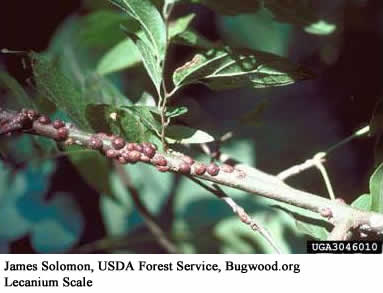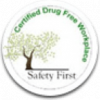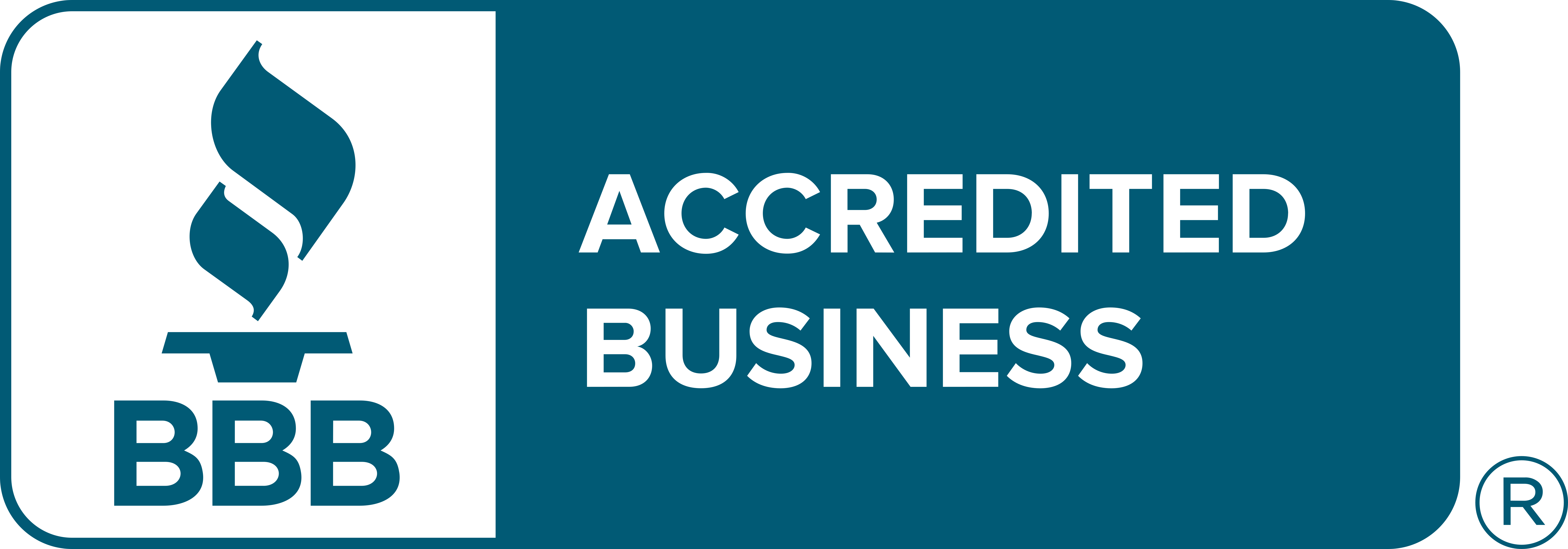 Description: Lecanium scale is a term used to refer to any of a dozen species of soft scales associated with shade trees and woody ornamentals and feed on their sap. They are hemispherical (turtle shaped), brown and range in size from 1/8 to 1/6 inches.
Lecanium scales overwinter as immature nymphs on the twigs and branches of infested trees. During April and May, nymphs resume feeding and the mature females produce 1,000 to 5,000 eggs which are protected by their soft waxy covering. Crawlers that hatch from these eggs move to leaves, settle, and feed on sap for the rest of the summer. They move back to twigs and branches prior to leaf drop and hibernate under a thin, waxy shield.
Symptoms: As with many soft scales, these insects produce large amounts of a liquid waste called ‘honeydew’. Severe infestations my stunt plant development and cause premature leaf drop and smaller flowers. Sooty molds often develop on the honeydew. Limbs of heavily infested trees may be blackened by the growth of this sooty mold. Branch dieback is also a consequence of massive Lecanium scale populations.
Lecanium scales are found throughout North America, and most kinds of trees can be infested with lecanuim scales, but dogwoods and oaks are most frequently infested.
Optimized tree growing conditions is the best defense because scales tend to thrive on stressed plants. By following a recommended fertility program and watering schedule plants will be less likely to succumb to infestations.
Action: Scale control is dependant on proper timing and may need to be repeated over several seasons.
Applications must target newly hatched scale crawlers which are active in June and July. They are susceptible to control measures while moving over the plant surface. Once they settle and begin to secrete their waxy coating they are shielded from sprays.
Thank you for reviewing this information. Schneider Tree Care is committed to preserving and enhancing the quality of your property through tree care education and services. We employ professionally trained and certified arborists who are available to meet with you for a consultation at no charge. If you have any questions or need additional information regarding the health of your trees, please contact us.
Description: Lecanium scale is a term used to refer to any of a dozen species of soft scales associated with shade trees and woody ornamentals and feed on their sap. They are hemispherical (turtle shaped), brown and range in size from 1/8 to 1/6 inches.
Lecanium scales overwinter as immature nymphs on the twigs and branches of infested trees. During April and May, nymphs resume feeding and the mature females produce 1,000 to 5,000 eggs which are protected by their soft waxy covering. Crawlers that hatch from these eggs move to leaves, settle, and feed on sap for the rest of the summer. They move back to twigs and branches prior to leaf drop and hibernate under a thin, waxy shield.
Symptoms: As with many soft scales, these insects produce large amounts of a liquid waste called ‘honeydew’. Severe infestations my stunt plant development and cause premature leaf drop and smaller flowers. Sooty molds often develop on the honeydew. Limbs of heavily infested trees may be blackened by the growth of this sooty mold. Branch dieback is also a consequence of massive Lecanium scale populations.
Lecanium scales are found throughout North America, and most kinds of trees can be infested with lecanuim scales, but dogwoods and oaks are most frequently infested.
Optimized tree growing conditions is the best defense because scales tend to thrive on stressed plants. By following a recommended fertility program and watering schedule plants will be less likely to succumb to infestations.
Action: Scale control is dependant on proper timing and may need to be repeated over several seasons.
Applications must target newly hatched scale crawlers which are active in June and July. They are susceptible to control measures while moving over the plant surface. Once they settle and begin to secrete their waxy coating they are shielded from sprays.
Thank you for reviewing this information. Schneider Tree Care is committed to preserving and enhancing the quality of your property through tree care education and services. We employ professionally trained and certified arborists who are available to meet with you for a consultation at no charge. If you have any questions or need additional information regarding the health of your trees, please contact us. 









